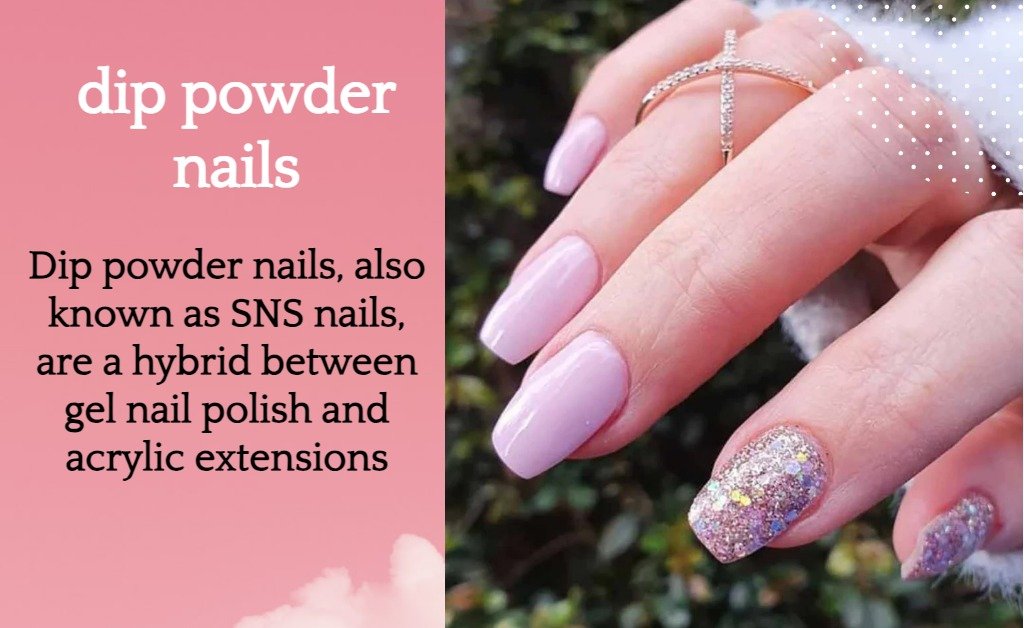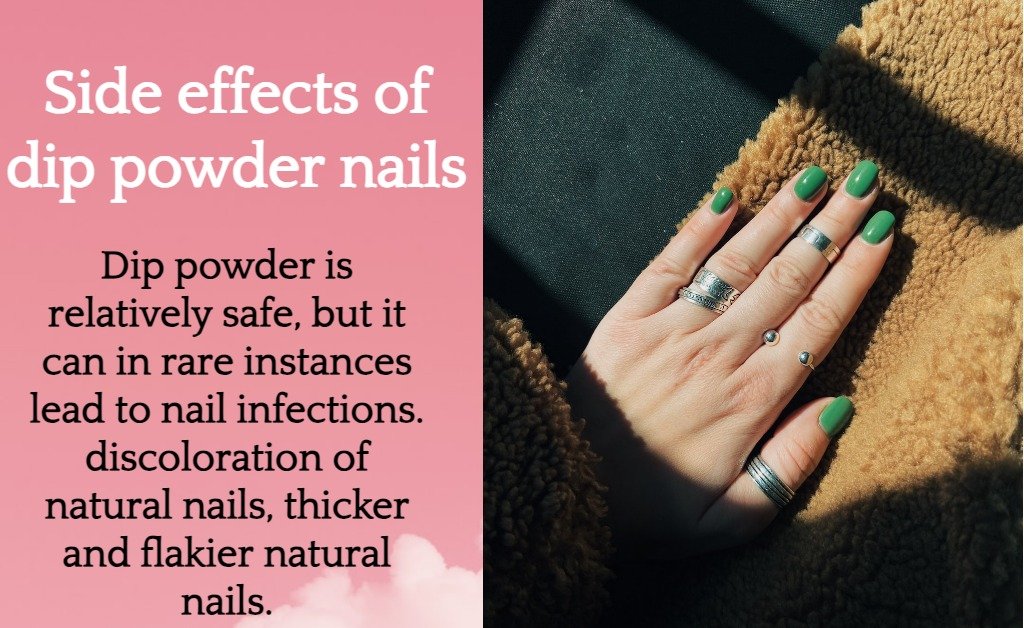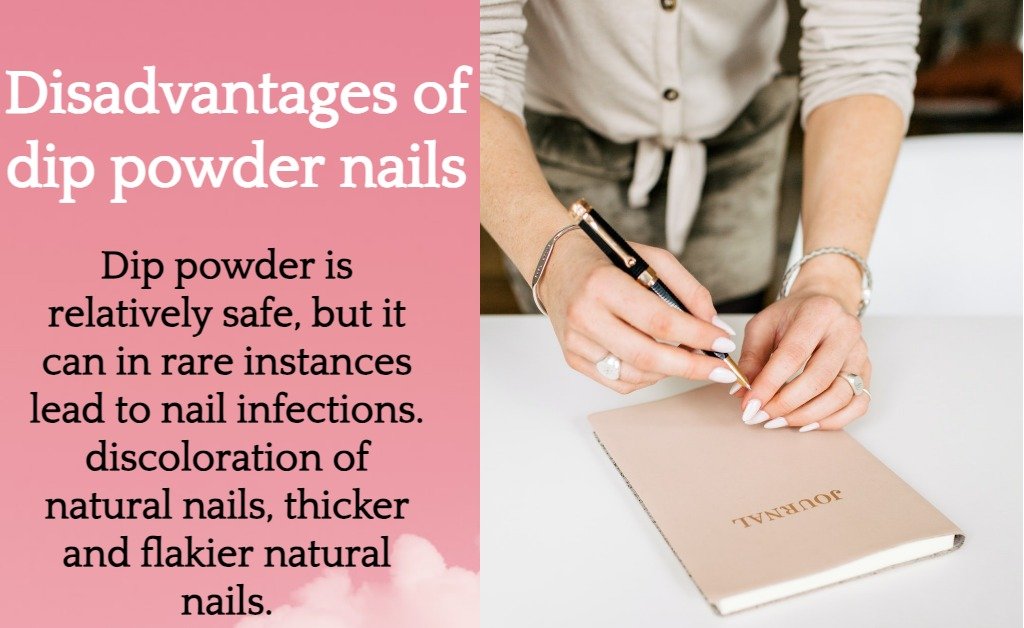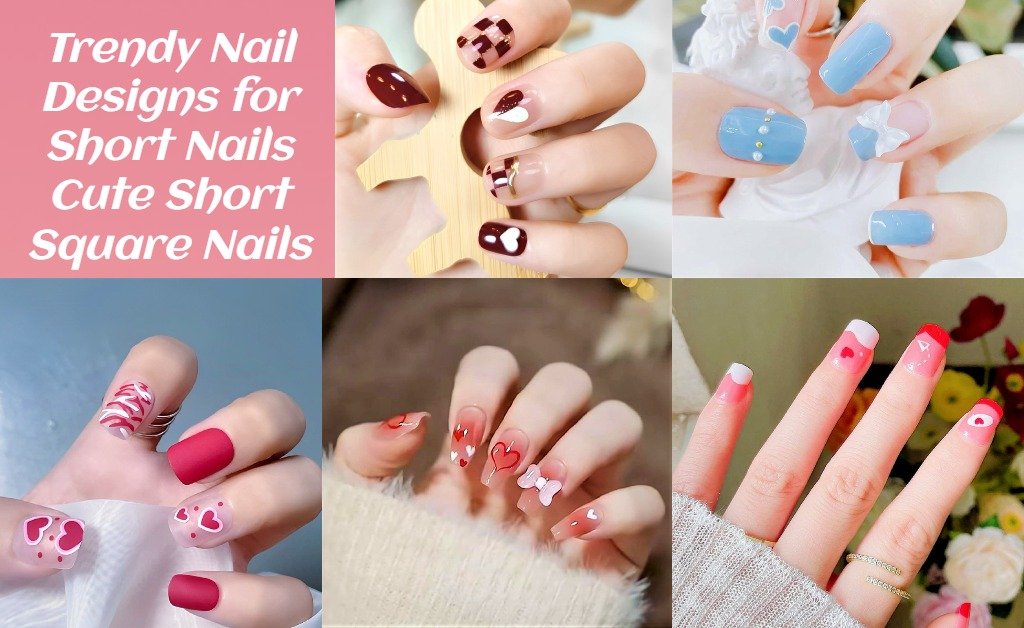Dip powder nails, also known as SNS nails, are a hybrid between gel nail polish and acrylic extensions that involve “dipping” the nail into a carton of pigmented powder. The powder is then topped with a clear sealant for a longer-lasting manicure. Board-certified dermatologist and nail expert Dr. Dana Stern adds to this, noting that dip powder nails have been around since the 1980s and are comprised of a gentle-yet-effective glue paired with acrylic powder.

Pros and cons of dip nails
- Dip powder is a popular way to get a great, long-lasting manicure.
- It creates amazing manicures and is quick and easy to DIY at home.
- The powder that is used for the dip nail process may be sometimes harsh on one’s nails and may cause it to get dehydrated.
Additionally, dip powders come in just about every color possible and allow you to incorporate nail art into your manicures, so it’s a fun way to express your creative side and please remember these pros and cons of dip nails.
Side effects of dip powder nails
Dip powder is relatively safe, but it can in rare instances lead to nail infections, discoloration of natural nails, thicker and flakier natural nails, tender and hurting nails, and a smelly odor. To prevent this, it is recommended to sprinkle the dip powder onto your nails instead of dipping them. Additionally, some individuals have reported developing flu-like symptoms after getting dip manicures, so it is important to test out the dip powder on one nail before doing a complete set.

Some enhancement technique involves applying layers of colored powder to the nails, which are then sealed with a clear sealant. While dip powder nails can provide a long-lasting and durable manicure, there are potential side effects associated with this process. Keep in mind that individual reactions can vary, and not everyone will experience these side effects. Some potential side effects of dip powder nails include:
Nail Weakness and Damage
The process of applying and removing dip powder nails can sometimes weaken and damage the natural nails. The filing and buffing involved in preparing the nails for the dip powder and the removal process can thin the nails and make them more prone to breakage.
Weakening of Natural Nails
The filing and buffing involved in the dip powder process can lead to nail thinning and weakening over time if done excessively or aggressively.
Nail Infections
If the application process is not done correctly, there is a risk of moisture getting trapped between the layers of powder, creating an environment where bacteria and fungi can grow. This can lead to nail infections and other issues.
Allergic Reactions
Some individuals might be sensitive or allergic to the chemicals present in the dip powder products, such as the bonding agents and sealants. Allergic reactions can manifest as redness, itching, swelling, or discomfort around the nail area.
Brittle Nails
Over time, repeated use of dip powder nails without giving the natural nails a chance to “breathe” can lead to brittle and weak nails. This is because the nails are continuously covered and do not have the opportunity to receive essential nutrients and moisture from the environment.
Skin Irritation
Improper application or accidental contact with the skin around the nails can cause irritation and redness. The chemicals used in the dip powder process can be harsh on sensitive skin.
Loss of Natural Shine
Dip powder nails often have a shiny finish, but excessive filing during the application and removal process can lead to a loss of the natural shine of the nails.
Difficulty in Removal
Removing dip powder nails can be challenging, and if not done correctly, it can lead to damage to the natural nails. Acetone soaking or scraping off the powder can cause the nails to become brittle.
Thinning of Nail Beds
Frequent buffing and filing during the application and removal processes can thin the nail beds, which are essential for healthy nail growth.
Discoloration
Some individuals have reported that certain dip powder colors can cause staining or discoloration of the natural nails. This is more likely to occur with darker colors.
To minimize the risk of experiencing these side effects, choosing a reputable nail technician who follows proper hygiene and application procedures is important. Additionally, taking breaks between dip powder applications to allow your natural nails to recover can help maintain their health. If you notice any adverse reactions or changes in your nails or skin, it’s advisable to consult a dermatologist or a healthcare professional for guidance.
Tips for better dip nails
To minimize the risk of these side effects, consider the following tips:
- Choose a reputable and experienced salon or technician.
- Avoid over-filing during the application and removal processes.
- Ensure proper cleaning and disinfection of tools and equipment.
- If you experience any signs of an allergic reaction or infection, consult a medical professional promptly.
- Give your nails a break between manicures to allow them to recover.
Remember that individual reactions and experiences can vary, so it’s important to stay attentive to how your nails and skin react and to make informed decisions about your nail care routine.
Disadvantages of dip powder nails

Dip powder nails, also known as SNS (Signature Nail Systems) or acrylic dip nails, have gained popularity as an alternative to traditional acrylic or gel nail extensions. However, like any beauty treatment, they come with their own set of disadvantages. Here are some potential disadvantages of dip powder nails:
Weakening of Natural Nails
The application and removal process of dip powder nails can involve filing and buffing the natural nails. This excessive filing can weaken the natural nails over time, making them more prone to breakage and damage.
Risk of Infection
If the tools and equipment used during the application process are not properly sanitized, there’s a risk of bacterial or fungal infections. Additionally, if the dip powder is applied too close to the cuticles, it can create an entry point for infections.
Limited DIY Application
While some people prefer to do their own nails at home, dip powder nails can be challenging to apply without proper training and practice. Improper application can lead to an uneven or clumpy finish.
Chemical Odor
The products used in dip powder nails often have a strong chemical odor that can be unpleasant for both the client and the technician. This can be particularly bothersome in poorly ventilated spaces.
Difficulty in Removal
Removing dip powder nails can be more challenging than traditional nail polish. It often involves soaking the nails in acetone, which can take a longer time and can dry the skin and nails if not done carefully.
Limited Design Options
While dip powder nails offer a range of colors and finishes, intricate designs and nail art can be more challenging to achieve compared to other nail extension methods like gel nails.
Cost
The initial cost of getting dip powder nails done can be higher than that of traditional nail polish, and it may also require additional maintenance and touch-up sessions, adding to the overall cost over time.
Time-Consuming Application
The process of applying dip powder nails involves multiple steps, including base coat application, dipping in powder, repeating the process, and applying the top coat. This can be time-consuming compared to other quicker nail enhancement methods.
Risk of Overexposure to Chemicals: Some of the chemicals used in dip powder nail products, such as acrylic powders and activators, can be harsh on the skin and nails. Prolonged or repeated exposure may cause drying, peeling, or sensitivity.
Allergic Reactions
Some individuals might develop allergic reactions to the chemicals present in dip powder nail products, leading to skin irritation, redness, itching, or discomfort.
Skill Dependency: The quality of the final result heavily depends on the skill and experience of the nail technician. If the technician is not well-trained or experienced, the outcome may not meet your expectations.
It’s important to note that experiences with dip powder nails can vary from person to person. If you’re considering getting dip powder nails, it’s a good idea to do thorough research, choose a reputable salon with trained technicians, and discuss any concerns you may have with your nail technician before the application.
Long term side effects of dip powder nails
Dip powder nails are relatively safe, but they can in rare instances lead to Nails hurting and feeling tender, Nail Infections, discoloration of natural nails, natural nails becoming thicker and starting to flake and peel off, nails feeling very tender and starting to hurt, and nails giving off a smelly odor.
It is important to give your nails a break from dip powder manicures at least once a month, as getting thick manicures on a regular basis can make your nails weaker over time. If you start to notice major brittleness, remove your dip powder manicure asap and leave your nails bare for two weeks.
Side effects of dip powder nails at home
Dip powder is relatively safe for the nails, but it can in rare instances lead to nail infections, discoloration of natural nails, thicker and flakier natural nails, nails feeling very tender and starting to hurt, and nails giving off a smelly odor.
The best way to remove dip powder at home is to file or buff off the top layer with an emery board in a back-and-forth, side-to-side motion until the top layer of your nails look dull and covered with fine white dust.
Conclusion
Dip powder is relatively safe, but it can in rare instances lead to nail infections. This can occur if different individuals dip their nails in the same dipping jar, which can spread germs. Other side effects of dip powder include temporary damage to the nails as the seal layer of the nails is broken in the process, temporal dehydration of the nails, contact dermatitis/allergic reaction, and flu-like symptoms. To protect your health, it is recommended to test out the dip powder on one nail before doing a complete set.
FAQs
Do dip nails cause cancer?
There is no direct evidence to suggest that dip nails themselves cause cancer. The concern surrounding cancer risk in nail treatments often revolves around exposure to potentially harmful chemicals and UV radiation from nail dryers.
How to remove dip powder nails?
The best way to remove dip powder nails is to file or buff off the top layer with an emery board in a back-and-forth, side-to-side motion until the top layer of your nails look dull and covered with fine white dust. You can then use 100% acetone from a drugstore or retail shop to loosen up the dip nail polish and get it off your nails.
Does dip powder strengthen nails?
Possibly Yes OR No Both, To strengthen your nails after using dip powder, it is important to drink plenty of water to promote new nail growth, let them rest between each dip powder application, use vitamin oil on the skin around your nails and nail bed to keep moisturized, and take vitamin supplements like biotin to promote nail growth.
What to do when dip nails grow out?
Dip nails are incredibly strong and thick, so they allow your natural nails to grow without breaking. To remove dip nails, you will first need to buff your nails and do your regular manicure, then paint a coat of nail polish on, dip your nail in the powder dip, shake it off, and let it dry. You will then need to file down the nail until it looks natural. If you are looking to grow your nails out, you might want to avoid dip powder, acrylic, or gel nails as constant exposure to acetone during the removal process can compromise the health of your nails.
Is dip powder bad for your lungs?
There isn’t definitive proof that dip powder is inherently bad for your lungs, there are concerns related to the chemicals used and the need for proper ventilation during application. To minimize any potential risks, it’s advisable to choose reputable nail salons, inquire about the products they use, and ensure proper ventilation is maintained during the process. If you have specific health concerns or sensitivities, consult with a dermatologist or medical professional for personalized advice.


